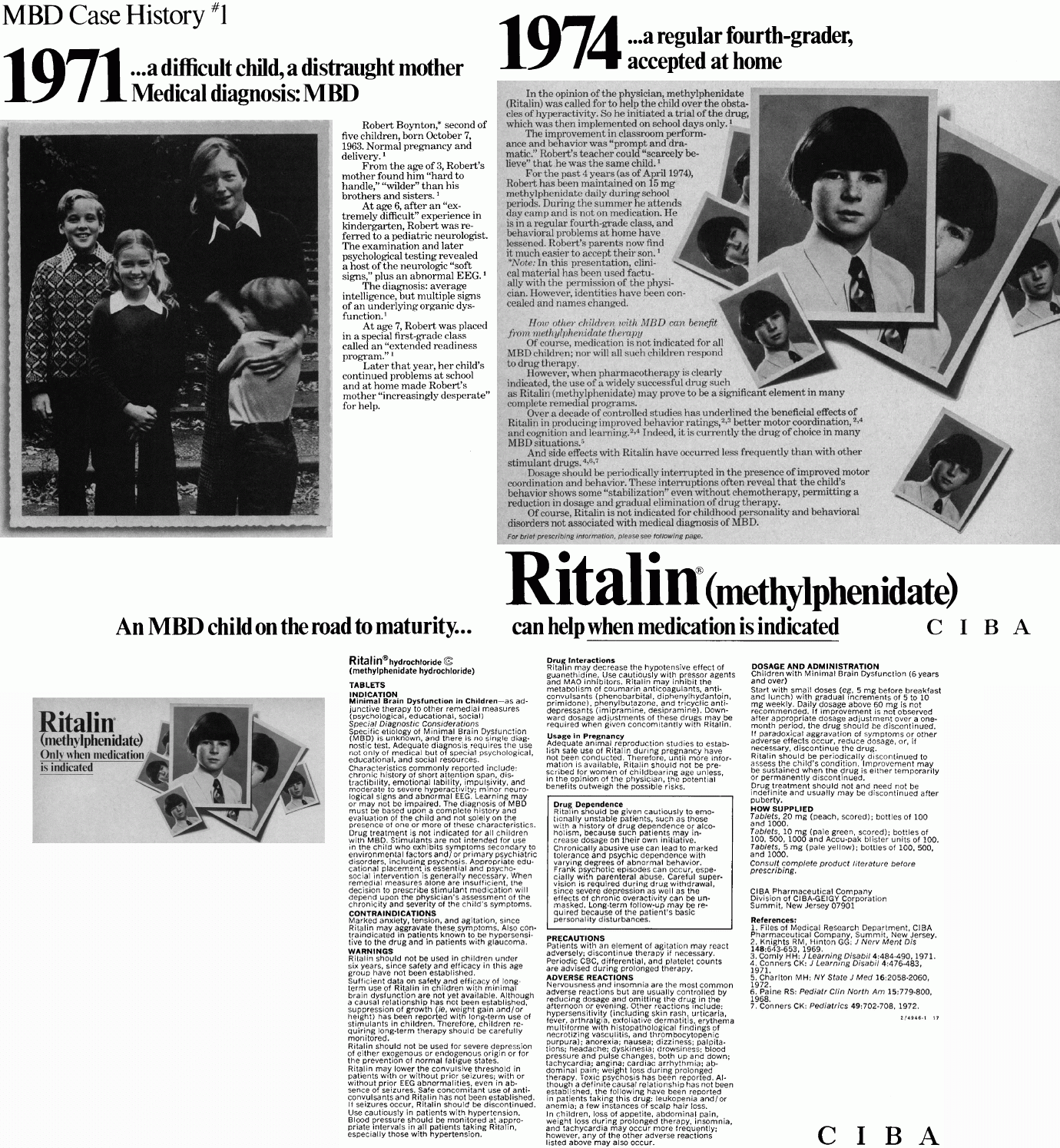

|
|
Ritalin advertisement, 1975. Archives of General Psychiatry, Vol. 32, No. 9, pp. 1094-1096. MBD Case History #1 1971 ...a difficult child, a distraught mother. Medical diagnosis: MBD 1974 ...a regular fourth-grader, accepted at home Robert Boynton,* second of five children, born October 7, 1963. Normal pregnancy and delivery.(1) At age 6, after an "extremely difficult" experience in kindergarten, Robert was referred to a pediatric neurologist. The examination and later psychological testing revealed a host of the neurologic "soft signs," plus an abnormal EEG.(1) The diagnosis: average intelligence, but multiple signs of an underlying organic dysfunction.(1) At age 7, Robert was placed in a special first-grade class called an "extended readiness program."(1) Later that year, her child's continued problems at school and at home made Robert's mother "increasingly desperate" for help. In the opinion of the physician, methylphenidate (Ritalin) was called for to help the child over the obstacles of hyperactivity. So he initiated a trial of the drug, which was then implemented on school days only.(1) The improvement in classroom performance and behavior was "prompt and dramatic." Robert's teacher could "scarcely believe" that he was the same child.(1) For the past 4 years (as of April 1974), Robert has been maintained on 15mg methylphenidate daily during school periods. During the summer he attends day camp and is not on medication. He is in a regular fourth-grade class, and behavioral problems at home have lessened. Robert's parents now find it much easier to accept their son.(1) *Note: In this presentation, clinical material has been used factually with the permission of the physician. However, identities have been concealed and names changed. How other children with MBD can benefit from methylphenidate therapy Of course, medication is not indicated for all MBD children; nor will all such children respond to drug therapy. However, when pharmacotherapy is clearly indicated, the use of a widely successful drug such as Ritalin (methylphenidate) may prove to be a significant element in many complete remedial programs. Over a decade of controlled studies has underlined the beneficial effects of Ritalin in producing improved behavior ratings,(2,3) better motor coordination,(2,4) and cognition and learning.(2,4) Indeed, it is currently the drug of choice in many MBD situations.(5) And side effects with Ritalin have occurred less frequently than with other stimulant drugs.(4,6,7) Dosage should be periodically interrupted in the presence of improved motor coordination and behavior. These interruptions often reveal that the child's behavior shows some "stabilization" even without chemotherapy, permitting a reduction in dosage and gradual elimination of drug therapy. Of course, Ritalin is not indicated for childhood personality and behavioral disorders not associated with medical diagnosis of MBD. For brief prescribing information, please see following page. An MBD child on the road to maturity... Ritalin® (methylphenidate) can help when medication is indicated ~ CIBA Ritalin® hydrochloride (methylphenidate hydrochloride) TABLETS INDICATION Minimal Brain Dysfunction in Children - as adjunctive therapy to other remedial measures (psychological, educational, social) Special Diagnostic Considerations Specific etiology of Minimal Brain Dysfunction (MBD) is unknown, and there is no single diagnostic test. Adequate diagnosis requires the use not only of medical but of special psychological, educational, and social resources. Characteristics commonly reported include: chronic history of short attention span, distractibility, emotional lability, impulsivity, and moderate to severe hyperactivity; minor neurological signs and abnormal EEG. Learning may or may not be impaired. The diagnosis of MBD must be based upon a complete history and evaluation of the child and not solely on the presence of one or more of these characteristics. Drug treatment is not indicated for all children with MBD. Stimulants are not intended for use in the child who exhibits symptoms secondary to environmental factors and/or primary psychiatric disorders, including psychosis. Appropriate educational placement is essential and psychosocial intervention is generally necessary. When remedial measures alone are insufficient, the decision to prescribe stimulant medication will depend upon the physician's assessment of the chronicity and severity of the child's symptoms. CIBA Pharmaceutical Company Division of CIBA-GEIGY Corporation Summit, New Jersey 07901 References: 1. Files of Medical Research Department, CIBA Pharmaceutical Company, Summit, New Jersey. 2. Knights RM, Hinton GG: J Nerv Ment Dis 148:643-653, 1969. 3. Comly HH: J Learning Disabil 4:484-490, 1971. 4. Conners CK: J Learning Disabil 4:476-483, 1971. 5. Charlton MH: NY State J Med 16:2058-2060, 1972. 6. Paine RS: Pediatr Clin North Am 15:779-800, 1968. 7. Conners CK: Pediatrics 49:702-708, 1972. |